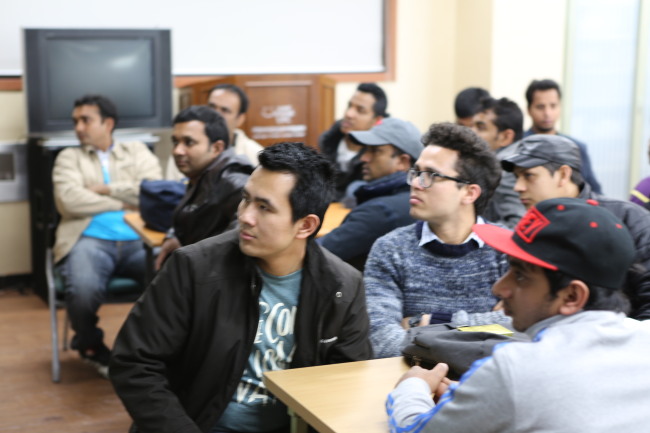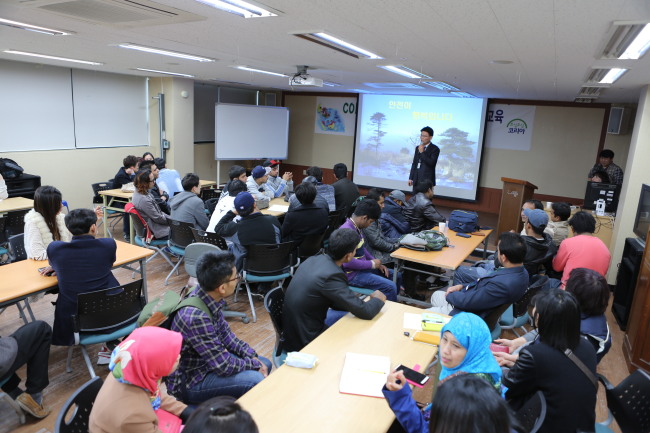Training offered to migrant workers to avoid work accidents
By Ock Hyun-juPublished : April 27, 2016 - 16:55
UIJEONGBU – One Sunday afternoon last month, a support center for foreign workers in Uijeongbu, some 20 kilometers north of Seoul, was filled with some 50 migrant workers who had travelled there from factory-concentrated cities in Northern Gyeonggi Province.
The foreign workers from nearly 10 Southeast Asian countries had gathered to attend a 30-minute lecture aimed at raising awareness on preventing work accidents by the state-run Korea Occupational Safety and Health Agency.
The program began with an introduction by Kang Nak-jin, a director of KOSHA’s North Gyeonggi Province office, who showed PowerPoint slides including pictures, videos and statistics on work-related accidents among foreign workers in Korea.
The foreign workers from nearly 10 Southeast Asian countries had gathered to attend a 30-minute lecture aimed at raising awareness on preventing work accidents by the state-run Korea Occupational Safety and Health Agency.
The program began with an introduction by Kang Nak-jin, a director of KOSHA’s North Gyeonggi Province office, who showed PowerPoint slides including pictures, videos and statistics on work-related accidents among foreign workers in Korea.

“You should be careful that the safety culture in Korea can be different from that in your countries,” the official said, showing common types of occupational injuries during the lecture.
Kang underscored the importance of the three factors – keeping workplaces tidy, conducting safety checks on machines and wearing protective helmets at all times.
“Something you always walk past such as square bars on a floor or ladders leaning against a wall could cause accidents,” he said. “Being careful at work is crucial to protect not only yourself but your colleagues.”
KOSHA, which is dedicated to promoting the safety and well-being of laborers in Korea, has been offering training on preventing work accidents for migrant workers and their employers for several years. The agency dispatches their officials across the nation to give lectures at factories or migrants support centers upon request through its website http://www.kosha.or.kr/.
Kang underscored the importance of the three factors – keeping workplaces tidy, conducting safety checks on machines and wearing protective helmets at all times.
“Something you always walk past such as square bars on a floor or ladders leaning against a wall could cause accidents,” he said. “Being careful at work is crucial to protect not only yourself but your colleagues.”
KOSHA, which is dedicated to promoting the safety and well-being of laborers in Korea, has been offering training on preventing work accidents for migrant workers and their employers for several years. The agency dispatches their officials across the nation to give lectures at factories or migrants support centers upon request through its website http://www.kosha.or.kr/.

The agency held 1,040 training sessions in 2015, up from 986 in 2014, involving a total of 57,671 foreign workers and their bosses.
Migrant workers in South Korea are exposed to a higher risk of work-related injuries because most of them are involved in jobs that are often considered dirty, difficult and dangerous, and hence avoided by locals.
Latest available data suggested that 30,142 foreign workers had sustained work-related injuries over 2010-14, among the nearly 1 million foreign nationals employed in the country. Of those who sustained injuries, 474 workers lost their lives.
Buddika Mabogoda, 35, from Sri Lanka told The Korea Herald that the lecture had been a good reminder of the importance of safety measures at work.
“I burned myself when I first started to work in Korea seven years ago,” he said after the lecture. “Many of the migrant workers do not speak or understand Korean and it is easy to forget about wearing personal protective helmets as we are mostly pressured for time.”
“This kind of training helps us to be aware of potential dangers at workplaces.”
Adminul Islam, a 31-year-old Bangladeshi who has worked for a drug company for five years, also agreed. “I often work on ladders. It was helpful to learn about how to handle the tools and machines to be more careful.”
KOSHA distributes content such as textbooks, videos and posters online and offline to remind workers and employers of potential dangers at workplaces and how to cope with work accidents.
It also launched a mobile application in 2012 featuring 1,300 sentences in 13 languages to help employers and their foreign employees to hold basic conversations about their health, wages, holidays and safety measures.
By Ock Hyun-ju (laeticia.ock@heraldcorp.com)
Migrant workers in South Korea are exposed to a higher risk of work-related injuries because most of them are involved in jobs that are often considered dirty, difficult and dangerous, and hence avoided by locals.
Latest available data suggested that 30,142 foreign workers had sustained work-related injuries over 2010-14, among the nearly 1 million foreign nationals employed in the country. Of those who sustained injuries, 474 workers lost their lives.
Buddika Mabogoda, 35, from Sri Lanka told The Korea Herald that the lecture had been a good reminder of the importance of safety measures at work.
“I burned myself when I first started to work in Korea seven years ago,” he said after the lecture. “Many of the migrant workers do not speak or understand Korean and it is easy to forget about wearing personal protective helmets as we are mostly pressured for time.”
“This kind of training helps us to be aware of potential dangers at workplaces.”
Adminul Islam, a 31-year-old Bangladeshi who has worked for a drug company for five years, also agreed. “I often work on ladders. It was helpful to learn about how to handle the tools and machines to be more careful.”
KOSHA distributes content such as textbooks, videos and posters online and offline to remind workers and employers of potential dangers at workplaces and how to cope with work accidents.
It also launched a mobile application in 2012 featuring 1,300 sentences in 13 languages to help employers and their foreign employees to hold basic conversations about their health, wages, holidays and safety measures.
By Ock Hyun-ju (laeticia.ock@heraldcorp.com)
-
Articles by Ock Hyun-ju











![[Hello India] Hyundai Motor vows to boost 'clean mobility' in India](http://res.heraldm.com/phpwas/restmb_idxmake.php?idx=644&simg=/content/image/2024/04/25/20240425050672_0.jpg&u=)








